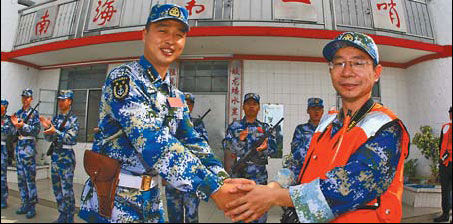Home away from home
Updated: 2012-07-17 09:51
By Yang Guang (China Daily)
|
|||||||||||
 |
|
Author Zhu Sixiong (right) meets one of his interviewees, Chen Fuwen, at Dongmen Reef. |
Related: Island exploration
Zhu Sixiong interviewed 27 soldiers during his 13-day trip to Nansha Islands, in his book An In-depth Exploration of the Nansha Islands.
Li Wenbo, 48, meteorological and hydrological observation officer
After graduating from Ocean University of China, majoring in hydrology, Li Wenbo has served on Nansha since the garrison was established in 1991.
As a technical officer, his job is to observe the complex and volatile meteorological and hydrological conditions in Nansha, collect and report data to the South Sea Fleet meteorological and hydrological center and the Hainan provincial meteorological bureau, in addition to his daily drills.
His job starts each day at 8 am and he collects data every three hours. Several officers take turns to provide 24-hour information. With advanced equipment, much of the work can be done indoors.
"Most of my old comrades-in-arms have left. Some were transferred to other places, while others were transferred to do civilian work," he says. "Many suffer from rheumatism and pains in their joints. Some even have slight psychological problems."
His wife and son have accompanied him to the base. Li says they sometimes complain when he's not around and about the boredom of life on the island.
"I understand but there is no way out. This is the way it is in the army."
Wang Fei, 32, cooking squad leader
Wang Fei joined the army after graduating from senior high school in 1999. He started serving at the Nansha garrison in September 2006.
The cooking squad starts working each day from 5 am. Five dishes - three meat and two vegetable dishes - plus soup are served for lunch and dinner. On Friday, there are extra dishes. The menu is adjusted every week.
For Wang, who has glowing ruddy cheeks and a baldhead, the greatest challenge is the shortage of fresh vegetables. They have tried planting some on the reef, but they cannot meet demand.
"We have also tried innovating, like making green peppers into pickles so they can be preserved longer."
Wang married in 2007. His wife and son live in his hometown in Sichuan province. They visit him for two months each year, and he also has about 80 days of holiday to return and stay with them.
"Nansha and the mainland are two completely different worlds. Life on the reefs is hard and dreary, but I like being in the army."
Chen Ruyi, 31, head of the Chigua Reef guarding unit
From Zhanjiang, Guangdong province, where the PLA South Sea Fleet is headquartered, Chen Ruyi joined the navy in 1999. He studied at a military academy in Nanchang, Jiangxi province in 2001 and arrived in Nansha after graduating in 2004.
"My family members all live in Zhanjiang, but they don't know much about Nansha," he says.
His parents were worried about him at first because they heard guarding the reefs could drive people crazy. "I told them it's not the case at all and they're more supportive."
"Officers and soldiers have a stable state of mind," Chen says, adding that most of the soldiers study by themselves and some have already obtained a junior college diploma.
"My parents gave me the name Ruyi in the hope that everything could turn out as I wish. It doesn't seem so, since I haven't found a girlfriend yet."
"But I'm not in a hurry. My priority at present is to do my work to the best of my ability."
yangguang@chinadaily.com.cn
Related Stories
Mike Stilkey's book art 2012-07-12 10:57
Cheryl Cole leaves interview after prank 2012-06-28 08:56
Beijing book fair spotlights S Korea 2012-07-03 10:36
Books to connect cultures 2012-07-04 14:02
Book celebrates tennis at Olympics 2012-07-10 10:09
Today's Top News
Rescuers race against time for quake victims
Telecom workers restore links
Coal mine blast kills 18 in Jilin
Intl scholarship puts China on the map
More bird flu patients discharged
Gold loses sheen, but still a safe bet
US 'turns blind eye to human rights'
Telecom workers restore links
Hot Topics
Lunar probe , China growth forecasts, Emission rules get tougher, China seen through 'colored lens', International board,
Editor's Picks

|

|

|

|

|

|





